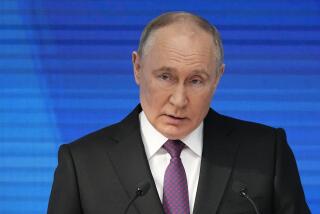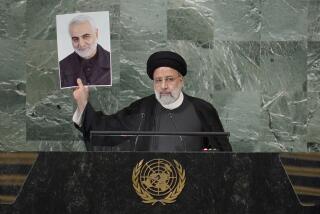Gorbachev to Iraq: Obey U.N. Calls or Face New Measures : Embargo: His warning implies collective military force unless Hussein leaves Kuwait and frees detainees.
- Share via
MOSCOW — Soviet President Mikhail S. Gorbachev, in an urgent personal message to Iraq’s leader, warned Saddam Hussein on Friday that if he does not immediately obey U.N. resolutions, the world body will be forced to impose “extra measures”--an apparent hint at the use of collective military force.
With the Bush Administration pushing hard at the United Nations for the approval of embargo enforcement powers against Iraq, Gorbachev in his message stressed “the pressing need for the Iraqi government to begin fulfilling without delay” U.N. Security Council resolutions demanding the unconditional withdrawal of Iraqi troops from Kuwait and the immediate release of an estimated 12,000 Western detainees.
“Evading the fulfillment of the resolutions will inevitably compel the Security Council to adopt corresponding extra measures,” Gorbachev warned Saddam in his message, according to a summary carried by the official Tass news agency. “It now depends on the Iraqi side how the Security Council will choose to act.”
In the light of the Kremlin’s evolving position at U.N. headquarters, Gorbachev’s message is likely to prove disquieting to the Iraqis--perhaps precisely because of the ominous vagueness of the “extra measures” envisaged by Gorbachev. The message described the situation in the Persian Gulf as “extraordinary and extremely dangerous.”
On Thursday, negotiators for the United States, Soviet Union, Britain, France and China announced tentative agreement on a U.S.-sponsored measure endorsing military force to uphold a trade embargo against Iraq. American and British envoys expressed hope that the agreement by the Security Council’s five big powers meant that Kremlin objections to the proposed resolution were ending and that the full 15-member body would adopt it by Sunday.
Earlier, Moscow had declined to support the American drive for a U.N. resolution authorizing “minimum use of force” to block Iraqi shipping. Only two days before Gorbachev’s message to Hussein, in fact, Foreign Minister Eduard A. Shevardnadze said U.N. resolutions already adopted--including the imposition of the worldwide economic boycott against Iraq--”clearly define the basis for a gulf settlement and the methods to attain this.”
Gorbachev, in what Tass called his “urgent personal message” to Hussein, held out the hope that conflict in the Persian Gulf could still be avoided by urging the Iraqi leader to “immediately take proper steps” in line with the U.N. resolutions.
State-run Soviet media and government officials were at pains to stress a tough line against Iraq after the admission earlier this week that Soviet military advisers were still teaching the Iraqis to use their Soviet-made weapons. The tough line also followed a visit by a top-level Iraqi envoy to Moscow and Shevardnadze’s willingness to give “serious attention” to Hussein’s proposal to release the Western captives in exchange for a U.S. military rollback.
Gorbachev’s message to Hussein, whose country was a longtime Soviet ally in the Arab world, “reiterated the Soviet Union’s position of principle that the annexation of Kuwait was illegal,” Tass said. Foreign Ministry spokesman Yuri A. Gremitskikh used the same word-- illegal-- at a government news briefing.
“After several days of ‘doubts’ caused by the recent visit to Moscow of Iraq’s special representative Saadoun Hammadi, international observers accredited in Moscow apparently were convinced today that the Soviet Union’s attitude to Kuwait’s annexation remains unchanged,” Tass correspondents Alexander Kanishchev and Yuri Rublevsky wrote in a commentary.
Soviet officials spent much of the week in talks seeking a way out of the crisis via diplomacy and have not cut all ties with Iraq, in an apparent effort to maintain their status as potential mediators. On Wednesday, Saudi Arabia’s ambassador to the United States, Prince Bandar ibn Sultan, met with Shevardnadze in Moscow and said the Kremlin could help “persuade” Hussein that he had erred by invading Kuwait.
At lunchtime Friday, about 100 Arab demonstrators chanted anti-American slogans in a well-choreographed protest held on a parking lot across a side street from the U.S. Embassy in Moscow. Men in their late 30s or 40s dressed in suits instructed the assembly, described in leaflets as a grouping of “Arab students,” on what slogans to shout.
As dozens of Soviet police officers stood between the embassy building and the protesters, the Arabs waved Iraqi flags and portraits of Hussein and chanted in Arabic.
No trouble was reported, but U.S. officials were worried enough beforehand to clear the sidewalk in front of the embassy of its customary throng of visa applicants and to post memos warning embassy personnel to stay away from windows.
More to Read
Sign up for Essential California
The most important California stories and recommendations in your inbox every morning.
You may occasionally receive promotional content from the Los Angeles Times.













